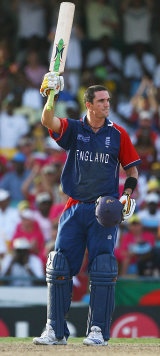
|

Kevin Pietersen: at last a century and a victory
© Getty Images
|
|
After a series of one-sided matches, the World Cup at last got a contest that went into the last over, and was finally decided with one ball, and one wicket, to spare, making it one of the most closely contested World Cup games ever: it was only the fourth instance of a match being decided by one wicket, and also the fourth time a team had won a World Cup game with one ball remaining. (
Click here for the smallest victory margins in World Cups.)
The key to such a close, high-scoring contest - the match produced an aggregate of 601 runs for 19 wickets - was the track, which was an excellent one for batting, and remained so throughout the 50 overs. So true was the pitch that two woefully out-of-form opening batsmen managed to belt half-centuries at faster than a run a ball - Chris Gayle, averaging 18.62 in the tournament before this match, crashed 79 from 58 balls, while Michael Vaughan, whose 130 runs before this knock had come at a meager 16.25, scored as many as Gayle did, using ten extra deliveries.
Both batsmen reveled in conditions that allowed them to hit through the line of the ball. Gayle took full toll of the full-length balls, crashing eight such deliveries for 28 runs, but was more circumspect against the good-length ones, scoring just 24 off 34. Vaughan, on the other hand, was confident enough to take on the good-length deliveries too, smacking 50 off 38 such balls. In fact, a better option for the bowlers against him was to pitch it too full or too short - he only scored at a run a ball off such deliveries.
The batsman who made the England victory possible, though, was Kevin Pietersen. None of his four previous hundreds had won the game for England - three were in defeats, while one was tied - but it turned out to be
fifth time lucky for him. During the course of the innings, Pietersen also completed 2000 ODI runs - he achieved the feat in just 45 innings, making him the
joint-fastest to get to the landmark, along with Pakistan's Zaheer Abbas. Pietersen finished the tournament with an aggregate of 444 runs, becoming only the second England batsman to total more than 400 in a World Cup -Graham Gooch aggregated 471 in 1987 - while he is also the first to score two centuries for England in World Cups.

